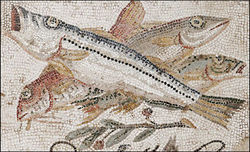
TWO PLACES AT ONCE
Taking into consideration that the ancient Romans lived around the Mediterranean Sea, they had provisions of barley, olive oil, and wine which are acknowledged as the Mediterranean Triad. These foods were what the Romans customarily ate and with all the foods containing carbohydrates, fat and proteins.
FOOD

TYPES OF FOOD
Romans had foods which were typical ordinary food such as bread, fruit, vegetables, meat, fish and sauces.
Click on image to view informtaion
 Fruit |  Meat |  Bread |
|---|---|---|
 Vegetables |  Alcoholic Drinks |  Sauces & Spices |
 Fish |

Meals
A Roman’s diet was one that was carefully balanced as it was based on wheat, occasional meat, fish, poultry, cheese, vegetables, fruit, salt, olive oil and wine.

Jentaculum, the Latin name for breakfast, was eaten at sunrise or at the first hour of daylight. Although many Romans did not eat breakfast and only drank a cup of water, the wealthier had different food choices for breakfast. This food choice included wheat pancake biscuit, bread dipped in wine, bread flavoured with cheese, bread with salt, dried fruits, honey, dates or olives.

Prandium was eaten at approximately eaten at noon and consisted of eggs with bread and cheese or leftovers from the previous day. Romans always ate lunch but it was usually a small proportion as they considered dinner as the main meal.

At around 2pm, Cena (dinner) would commence for the upper class while the lower classed ate at around the ninth or tenth hour. The poor would usually eat wheat meal porridge which was known as puls. However, the rich occasionally held feasts until late at night if guests were invited.

Jentaculum, the Latin name for breakfast, was eaten at sunrise or at the first hour of daylight. Although many Romans did not eat breakfast and only drank a cup of water, the wealthier had different food choices for breakfast. This food choice included wheat pancake biscuit, bread dipped in wine, bread flavoured with cheese, bread with salt, dried fruits, honey, dates or olives.
Hover mouse over slidshow to view information
Cooking
Food in ancient Rome were generally boiled or fried in olive oil thus, only the rich had ovens which they had little use of. Nonetheless, ovens could be found as portable ovens or a low beehive like oven. A portable oven was created using earthenware, iron or bronze, but an oven made of rare metals could also be found in the rich’s home. A normal oven would be constructed of rubble and tiles. Cauldron chains were also used in Pompeiian cooking, which was used for suspending cooking pots over fire from wood. Other kitchen equipment was found for more complex cookers and the chefs of a wealthy Roman.

Banquets
"After a generous rubdown with oil, we put on dinner clothes. We were taken into the next room where we found three couches drawn up and a table, very luxuriously laid out, awaiting us. We were invited to take our seats. Immediately, Egyptian slaves came in and poured ice water over our hands. The starters were served. On a large tray stood a donkey made of bronze. On its back were two baskets, one holding green olives, and the other black. On either side were dormice, dipped in honey and rolled in poppy seed. Nearby, on a silver grill, piping hot laid small sausages. As for wine, we were fairly swimming in it."
This passage was written by a writer named Petronius in 60AD. As shown in the passage a banquet consisted of exotic items and food and meals were commonly served with sauces. Sauces were considered an extremely significant part of Roman food for both chefs and Romans. It gave a new fresh opportunity for chefs while it made the food more interesting than what it may have been for the Romans. The most favourited sauce of the ancient Romans was the garum which was cooked using fish waste and salt water mixed together. It would then be left for several weeks to rest until it was ready to be used. Other sauces also included vinegar, honey, pepper, herbs and spices. Romans were extremely. Romans usually have a Hors d’oevres as the first phase of their big feast followed by a glass of wine sweetened with honey. They will then have a main course, known as prima Mensa in Latin, and an offering to the Gods afterwards. This consists of a short silence while an offering to the gods were made at the host’s family alter. Dessert and dinner drinking will then commence with entertainment lasting till the end of the banquet.








